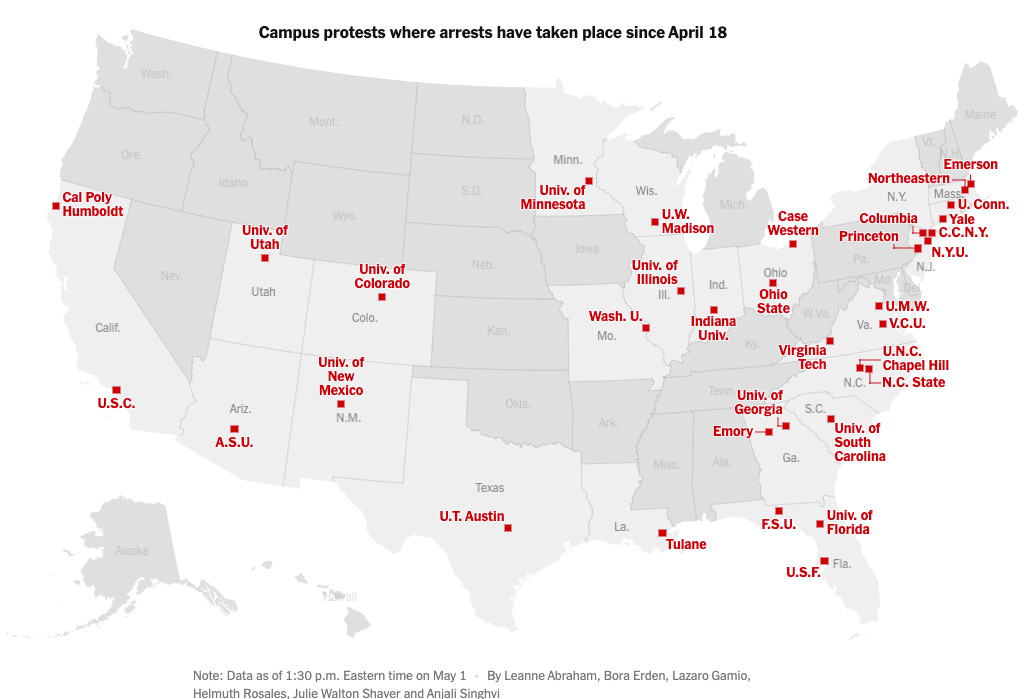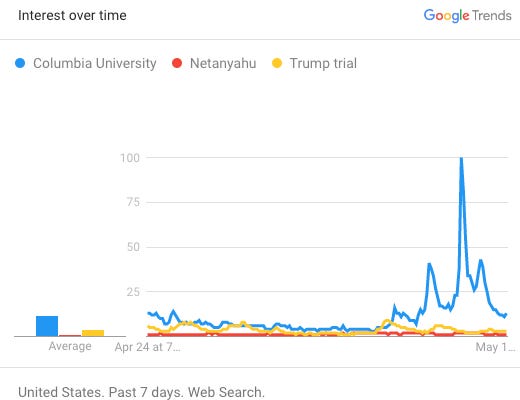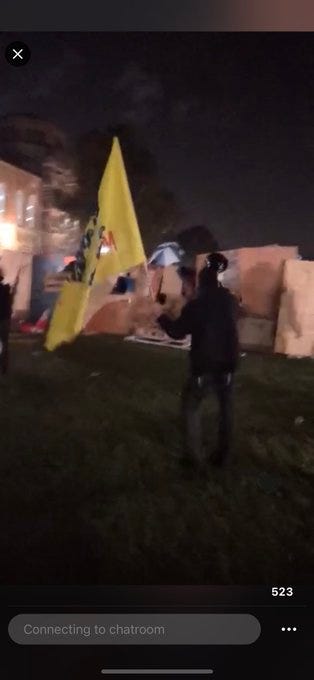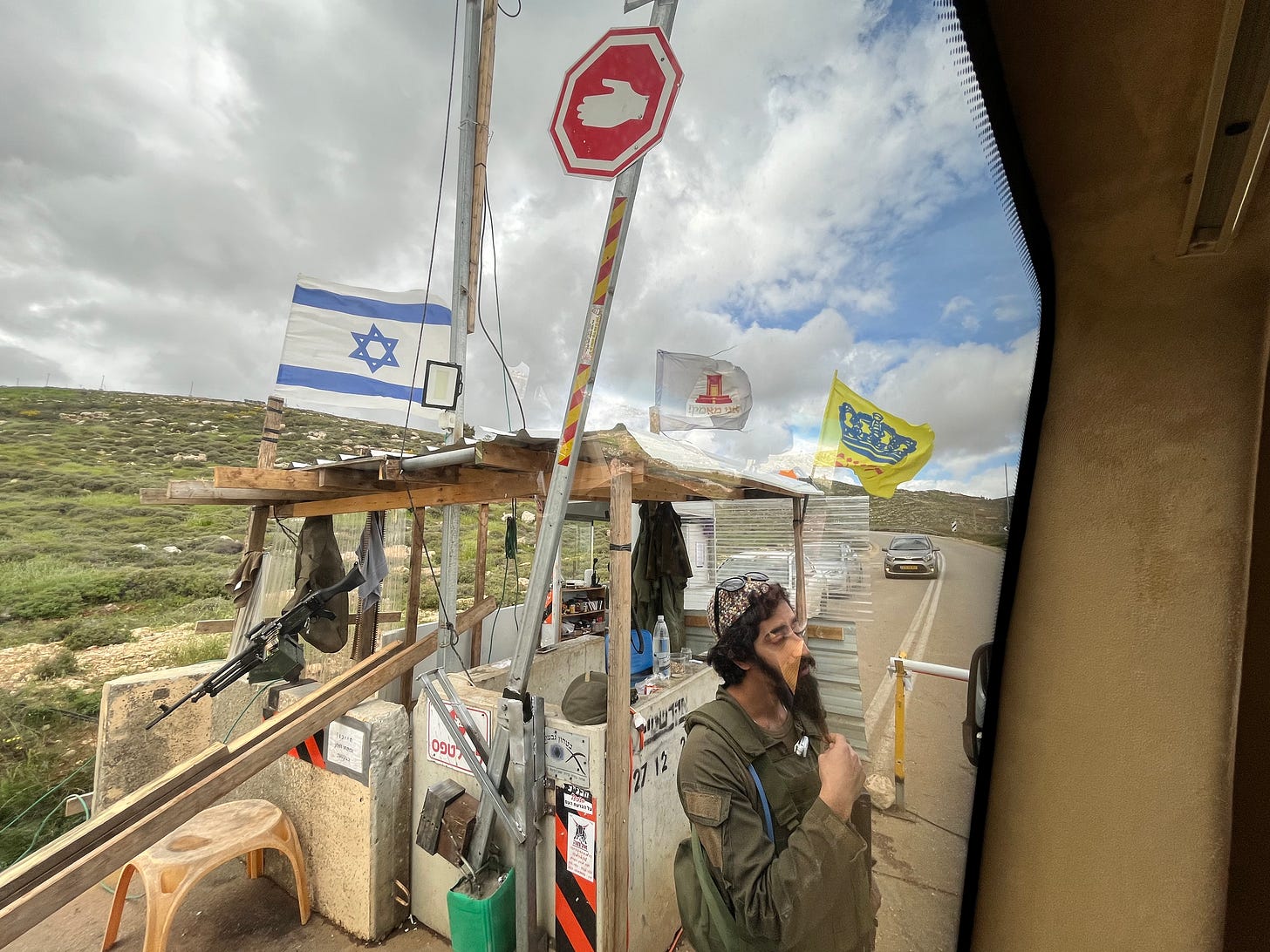Columbia, Anti-Zionism and the Coming American Backlash
With radicalized students setting up Gaza solidarity encampments across America, our attention is being drawn to inevitable police crackdowns rather than Bibi Netanyahu's plan to invade Rafah.
Last night, for two hours my wife and I listened live to WKCR-FM, the Columbia University student radio station as it covered the police crackdown there, while also watching CNN, which had one of the only reporters inside the university gates as events played out.
There were moments from the live coverage that broke my heart: once when the cops forced everyone including press away from Hamilton Hall, where the most radical of the student activists had barricaded themselves, and a young male student reporter (Shimon, I think his name was) said that meant no media would be on hand to witness the police action. The second time came maybe a half hour later, when a young woman reporter read the just-released letter from Columbia President Minouche Shafik inviting the New York City police onto campus to arrest the students in Hamilton Hall and clear their tent encampments. (The WKCR radio reporting team had earlier read a statement from Columbia faculty decrying Shafik’s decision, pointing out that “senior University leadership” had rebuffed their efforts to mediate and defuse the situation and arguing that University statutes requiring consultation with faculty before inviting armed police onto campus had been ignored.) The young woman reporter’s voice broke when she got to the part about police staying until May 17, after graduation. I’m sorry, she said, but the idea of police all over her beloved campus had gotten to her.

Every now and then you could hear the protesters singing about standing with each other. It was heartbreaking, even if some of these kids have a limited or flawed understanding of the Israel/Palestine conflict. Sophie Ellman-Golan, the communications director for Jews for Racial and Economic Justice (JFREJ), an important force on the sane progressive left in NYC, captured the implications of the moment well, I thought, with this tweet last night:
Ellman-Golan is right to ask how Democrats can justify police repression not only because it’s an attack on part of their base; it also sends a terrible message to authoritarians around the world. And on top of that, what a distraction from more important news. I broke my pledge to stop posting on Twitter last night to comment mournfully, “All this happening while Netanyahu apparently scuttles a hostage/ceasefire deal and Trump makes clear his nightmare plans for a second term.” This chart below from Google Trends shows what I mean: instead of public attention being focused on how the extreme rightwingers in Israel’s government would prefer to invade Rafah, where more than a million Gazans are sheltering, instead of bringing hostages home, and instead of public attention flowing towards Trump’s declared plans for a second-term kind of American fascism, it’s been drawn towards our polarized universities. (This morning Google said one of the search terms in the US was UCLA, where cops have also been cracking down on student protestors for their supposed threat to public order, though in this case it looks like pro-Israel counter-protestors were far more violent, as the Los Angeles Times’ education reporter Teresa Watanabe put it, “stunning violence after pro-Israel mob attacks pro-Palestinian encampment.”)
Let’s face it, folks. We are living in highly volatile times. It may look like a “mass movement” is on the march against US support for “occupation, apartheid and genocide of Palestinians” (as JFREJ said in a statement condemning the “state violence” in NYC this morning) but I suspect instead what is happening as a result of this protest wave (not mass yet in any serious sense of that word) is the stampeding of a generation of liberal Americans towards the right as they recoil from the extremists inside the heart of these pro-Palestine protests. It’s no coincidence that many sensitive participant/observers in the Israel-Palestine conflict here, including Rabbi Sharon Brous of IKAR in Los Angeles, Gazan expatriate Ahmed Fouad Alkhatib, Palestinian-American design whiz Mo Husseini, progressive journalist Zaid Jalini and Iranian progressive academic Arash Azizi have rushed out smart statements or pieces in the last week urging pro-Palestine activists to get their house in order and reject maximalist and exterminationist rhetoric.
There’s no question that the so-called adults in the room, like Columbia University’s president and trustees, have grossly mishandled the Palestine solidarity protestors on their campuses. Student encampments across America didn’t really take off until President Shafik called in the NYPD on her students two weeks ago to break up their tent encampment. And there’s nothing like the sight of raggedy students asserting their right to free speech followed by burly cops beating them and their allies up to swing American voters to the right. Generations of rightwing American politicians, from Nixon to Reagan to, now, Trump, have benefited from these kind of backlashes.

If suburban women are more worried about their kids or their friends’ kids experiencing some campus turmoil or, if they’re Jewish, some unpleasant criticism of Israel, even some ugly antisemitism from misguided campus radicals, than they are worried about their daughters not being able to access reproductive healthcare because of rightwing fundamentalists in charge of the Supreme Court and Congress, the 2024 election may well go down the drain for Democrats. While it is true that police violence can backfire and generate widespread sympathy for a movement too—a lesson that Martin Luther King used to brilliant effect during the Children’s Crusade marches against Bull Connor’s Birmingham—without recognized leaders who can speak for a movement and its strategy for change, populist authoritarianism ends up benefiting more from outbreaks of violence.
And what can you say about a campus claque that had as a leader an idiot named Kymani James who in January told university administrators that “Zionists don’t deserve to live,” and in April, in a widely seen viral clip, led a crowd of dozens at Columbia’s Gaza Solidarity Encampment in forcing a few Jewish students to leave because “We have Zionists who have entered the camp.” You have to watch that clip to listen to James’ intonation of the word “Zionists” to understand the valence of the moment: Jews who do not reject their personal emotional affinity for the Jewish homeland are not deemed to be people worthy of respect or inclusion. As I wrote a week ago about the “anti-imperialism of fools,” what today’s “pro-Palestine” left is demanding is not self-determination for Palestinians and co-existence with Israel but erasure of the Jewish people’s right to self-determination. In this project, they have as much chance of success as a movement to give the United States back to its native peoples.
How did we get here?
How exactly did we get to this place, where instead of a broad peace movement putting pressure on both Hamas and Israel to end their Gaza war, we have an anti-Zionist movement demanding very unrealistically that American institutions end all ties and support for Israel, and a pro-Israel movement continuing to defend unconditional aid to Netanyahu’s forever war policies and bleating about “freeing the hostages” without putting any pressure on Bibi making a deal to do so?
I have a theory, which I’ve laid out in bits over the last few months, but here I’ll try to summarize it—even though it’s admittedly just a theory.
October 7 was a huge shock, worldwide. Here in the United States, the first groups to respond in the streets came from the anti-Zionist, “anti-imperialist” left. That was exemplified by the infamous “All Out for Palestine” rally in NYC on October 8, promoted by Democratic Socialists of America to its shame, along with other far more sectarian groups like ANSWER and the People’s Forum, where speakers like Eugene Puryear of the Party for Socialism and Liberation (pictured on the left in the montage at the top of this essay) praised Hamas’s attack. National Students for Justice in Palestine put out a corollary toolkit that glorified it as legitimate “resistance.”
Meanwhile, the American political establishment, including the leadership of both parties, moved rapidly to “Stand with Israel” and insist that Hamas was pure evil and had to be completely eradicated—a dangerous and unrealistic posture as well, considering the complete absence of any recognition of Palestinian rights and needs. The White House declared that the attacks was “unprovoked.” That prompted both If Not Now and Jewish Voice for Peace, the two Jewish groups that have done the most grassroots organizing on Israel/Palestine in recent years, to rush out statements insisting that in fact, “75 years of occupation and violence” by Israel had provoked October 7. Note: that choice, to date the beginning of the problem to 1948, when Israel was founded, is an important signal. It leads to the denial of the Jewish national project (i.e. Zionism) rather than a resolution of the Israeli-Palestinian conflict via a historic compromise (i.e. two states for two peoples). But such is the politics of anti-Zionism. Other progressive organizations, including Jewish-led ones, froze in place, or if they did anything, made understandable statements that sympathized more with Israel, the victim on October 7, than with Palestinians.
Notably, as the details of what actually took place that day became clearer, Jewish leftists struggled to find their footing. After all, those initial reactive statements blaming Israel as the main or sole source of all the violence didn’t sit too well in the face of Hamas and other fighters’ choices to rape, pillage and burn civilian families alive. If Not Now even posted a few tweets noting that some of their own staff had lost family and friends that day. On top of that, Jewish progressives, both inside these groups and beyond, started seeing and sharing shocked reactions as they saw many non-Jewish activists, including colleagues they may have thought of as “allies” expressing solidarity solely with Palestinians and even justifying what Hamas did.
Ben Lorber, a former national campus director of Jewish Voice for Peace, went on Twitter/X on October 9 to question the pro-Palestine left for not being able to “to vocalize in this moment a principled opposition to massacre of Israeli civilians.” He told the Forward’s Arno Rosenfeld that he, a researcher of white supremacist movements and longtime Palestinian solidarity activist, “could not stomach” hearing ‘Resistance is justified when people are occupied.’
For a few days, confusion reigned. In an late October interview on Jewish Current’s “On the Nose” podcast, If Not Now political director Eva Borgwardt and Jewish Voice for Peace organizing director Elena Stein talked openly about the intense pressure they and their colleagues were under to figure out their response in those first days while also dealing with the need to grieve. Stein admits that maybe they weren’t as thoughtful as they could be, but that falling back on prior ideological commitments felt right. Borgwardt admits that she and her colleagues, average age 28, felt overwhelmed. Arielle Angel, the editor of Jewish Currents, told the Forward’s Rosenfeld that internal debates were raging for several days.
But then, less than a week after October 7, the Jewish left found its point of unity. As Angel put it, “We cannot get caught up in petty b——– right now. We need to be talking about the fact there’s an imminent genocide.” One article, published by her magazine on October 13—a mere six days after the crisis began—summed up the new certainty: “A Textbook Case of Genocide,” by Raz Segal. Even though Segal himself would soon note that the vast majority of legal scholars actually viewed the situation as being a potential genocide, it didn’t matter. Game on. Jewish groups like If Not Now and Jewish Voice for Peace were soon leading angry demonstrations where stopping a genocide—not stopping a war—was the goal. If they held signs or made chants that called on Hamas to release the hostages and stop firing rockets into Israel, that would be news to me.
If your goal is to delegitimize Israel, nothing could be more powerful than this choice to oppose genocide instead of war. Once a country is tagged as “genocidal,” it’s no better than Nazi Germany. This is also a very good way to emotionally mobilize and polarize activists against other people. But one doesn’t compromise and co-exist with genocidal regimes. One destroys them. And one demonizes their allies, like “Genocide Joe,” even if the choice to undermine support for Biden increases the chances that Trump, a man who has expressed actual genocidal intentions and admiration for murderous dictators, gets to replace him.
Plenty of people have written eloquently about how Jews don’t fit into the modern left’s understanding of intersectionality and the hierarchy of oppressed groups, and also how Jews are coded as “white” and beneficiaries of “white supremacy.” I have no doubt that too helped shape the response of many non-Jewish progressives unsure of which side they should be on in the ensuing struggle.
Meanwhile, the “pro-Israel” side of this conflict, centered and led by groups like the Anti-Defamation League, AIPAC and the Conference of Presidents of Major American Jewish Organizations, has long been dominated by rightwingers far more concerned about flare-ups of antisemitism coming from the “radical left” in America than from the Christian right. It’s not surprising to see their leaders now aligning with Republican House Speaker Mike Johnson—even if most American Jews still vote Democratic.
I’m honestly not sure if that political tilt will continue, though. If Netanyahu follows through on his promise to invade Rafah, which he has made because staying in power matters more to him than anything else, and his far-right coalition will collapse if he accepts a hostage deal without invading, the response in the US will be ferocious. Biden may well suspend military aid—something he maybe is threatening privately—but I am starting to really fear that things have gone too far down the current road for anything to change course.
But maybe not. Listen to this interview that Sharon Brous just gave to CNN’s Christiane Amanpour. After visiting both the Columbia encampment and then returning back home to Los Angeles to walk amidst the violence between pro-Israel activists and pro-Palestinian activists at UCLA, Brous has an urgent and cogent message centering the peace-building work of Standing Together and the need to build a genuine peace movement here to bridge the chasm that maximalists on both sides keep expanding and exploiting.
End Times, Indeed
Ben Lorber spotted the Chabad movement’s yellow “Moshiach” flag being brandished by one of the pro-Israel thugs who attacked the ACLU pro-Palestine encampment.
The last place I saw that flag, it was in early March, alongside a Temple Mount flag being flown by an Israeli settler on reserve duty in the West Bank, where he illegally stopped an Americans for Peace Now tour bus I was on from proceeding because we had Arabs (Israelis) on it.








Good work, Micah, sustaining the conversation, argumentation, and learning (the "tradition"). I can't help reflecting on how Berkeley 64 was used by Reagan 66 or Chicago 68 used by Nixon 68.
The term "genocidal zionists" has now entered the public discourse. "Jewish intellectuals" like Naomi Klein are disavowing the entire "delusional" concept of zionism, citing the pre-Shoah lukewarm reception of a "Jewish national home in Palestine." Where did the Bundists go? Hmm, what happened to those people? She, like others, cites Hannah Arendt's questioning of the efficacy of the Zionist project (like the mythical Golem in German-speaking Prague) but leave the part out about the exiled philosopher's years in Paris working for Youth Aliyah to get as many young Jews out of the Reich as possible. The bitch - as many Jews saw her post-Eichmann in Jerusalem - was actively engaging in displacing future indigenous Palestinian grandchildren & great-grandchildren. Klein, whom I have admired, is on the board of Jewish Voice for Peace. Setting aside the improbability of there being a singular (Jewish) Voice, I found years before October 7 that it expressed boundless anger but not one ounce of sadness, i.e. heart. (Five years, their benevolence towards the "great unwashed" Sephardi & Mizrahi communities for some reason didn't sit well: https://www.jimena.org/sephardic-and-mizrahi-communal-response-to-jewish-voice-for-peace/ )
JFREJ - with an inestimable domestic rights record - hired two ex-JVP staffers for policy posts. IfNotNow, which is much needed now, began to precisely match that single Voice, despite maintaining a different, more thoughtful essence on its website. I ceased my recurring monthly donations to those two - as all three now seem to really be one & also wonder how the Jewish Right - which tends to be wrong - snuffed out Open Hillel. Talk about a suffocating institution. There should be no surprise when the Netanyahu (& Smotrich & Ben-Gvir) loving Chabad's campus reps urge all Jewish students to flee.
This is from today's Haaretz: Israel at War newsletter:
"Israel's universities should be seething with protests just as much as Columbia and Yale. If not, Israel's ostensibly enlightened and liberal academia will remain identified with Israel's government and its destructive policies. As long as the universities and the students remain placid, there is no point calling on academics around the world to relate any differently to official Israel and the country's academics who want to be perceived as peace seekers" - Shany Littman